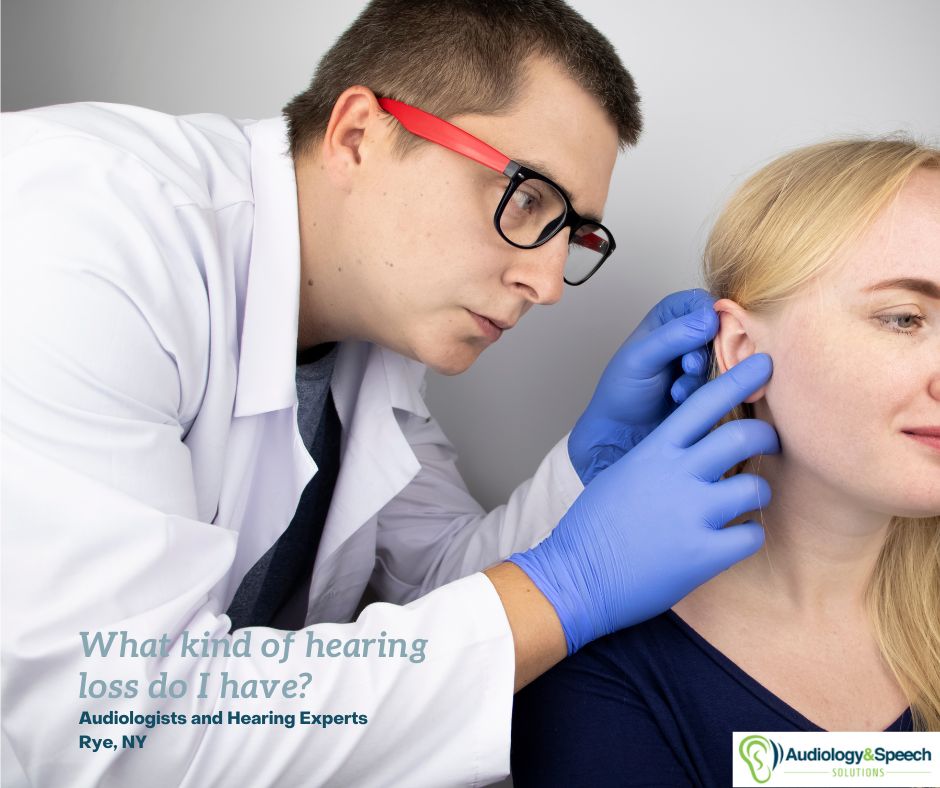Hearing is a complex process that requires the coordination of a number of different body parts and functions. To hear properly, sound must travel through the outer ear, to the middle ear, and then to the inner ear, where it is converted into signals that are detected and decoded by the brain.
There are a number of ways in which things can go awry in the hearing process, and when they do, the result is hearing loss. The type of hearing loss depends on what exactly has gone amiss in the process of hearing.
Only audiologists can fully assess the type and extent of hearing loss and help you make a plan for treatment options. Diagnostic services for hearing loss include otoscopy, middle ear assessments, speech testing, and comprehensive hearing testing using traditional and state-of-the-art equipment.
Getting a hearing test
The first thing you need to do to identify your specific type of hearing loss is to get a hearing test. Audiologists perform several kinds of hearing tests and diagnostics to accurately pinpoint the type and extent of your hearing loss.
Types of Hearing Tests
Below are some common types of hearing tests:
Otoscopic examination
Otoscopy is a clinical method that is used to check ear structures, namely the tympanic membrane, external auditory canal, and middle ear. The procedure is used by audiologists during general physical exams and evaluation of specific ear issues. This is one of the most basic hearing tests.
Middle ear assessments (Tympanometry)
This test will check how well your eardrum is functioning. We will place a small probe into each ear and it will push some air into the ear. Tympanometry can help diagnose if you have:
- Fluid in the middle ear
- Otitis media
- A perforation in the tympanic membrane
- Issues with the eustachian tube
Comprehensive hearing tests
A battery of hearing tests may be performed to accurately diagnose the type and extent of hearing loss. Comprehensive hearing tests assess your hearing abilities in relation to age-appropriate hearing thresholds within normal limits. It aims to establish whether hearing loss is present, what part of the ear is affected, and pinpoint the type and classification.
Speech testing
One of the more basic forms of hearing tests is speech testing. This can determine each ear’s speech reception threshold. Speech testing can confirm the results of a pure-tone test performed on older children and adults.
Auditory Brainstem Response (ABR) Test
ABR focuses solely on the acoustic (hearing) nerve, the inner ear, and a portion of the brain pathways linked with hearing. Electrodes are placed on the person’s head for this test (similar to electrodes placed around the heart during an electrocardiogram (EKG). Brain wave activity in reaction to sound is documented.
Hearing Aid Selection
Knowing the type of hearing loss you have also makes the process of hearing aid selection a lot easier.
Hearing aids vary in their features and technology. Modern hearing aid features include tinnitus management, auto-directionality, tinnitus management, rechargeability, wireless connectivity to devices, etc.
By knowing the type of hearing loss you have, you can prioritize the non-negotiable features for your device. An audiologist can help you navigate through the various hearing aid features and recommend different models that would best suit your hearing needs.
Audiologists and Hearing Tests in Rye, NY
At Audiology and Speech Solutions, we believe in an integrated and highly individualized approach for our patients.
We perform in-depth evaluations with comprehensive reports to help you and other professionals understand your communications strengths and deficiencies.
Contact us today to schedule a hearing test in Rye, NY!

